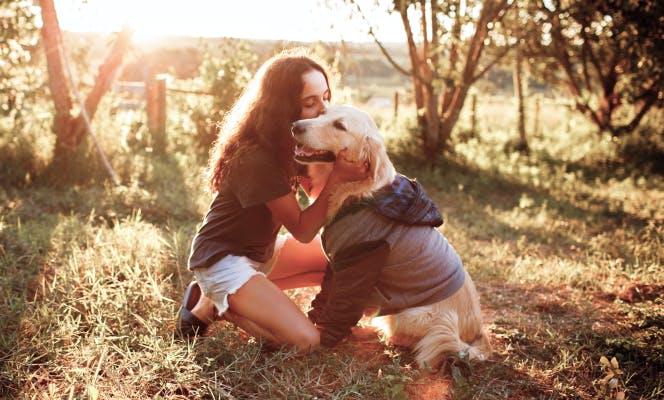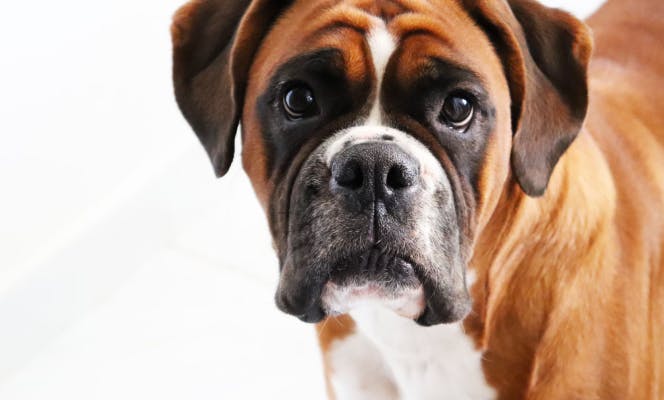Choosing the Best Dog for a Special Needs Child
The bond between a child and their dog is something truly special–and that’s all the more true when that dog serves as a protector and support animal for a child with special needs. In fact, such relationships can be life-changing.
If you’re the parent of a special needs child, you already know how important it is to do your own research on subjects like support animals. Many dog breeds do well with children who have autism, and emotional or physical limitations, but every dog and every child is an individual with unique traits.
Some breeds are physically fragile, have excessive exercise or grooming needs, or are more prone to excitability than others. Depending on your child’s mobility level and personality, these breeds may not be ideal as a support dog.
So, what is the best dog breed for your special needs child? There’s a lot to consider, but we’re here to offer you guidance and support throughout the entire process!
Why Dogs are Good for Special Needs Children
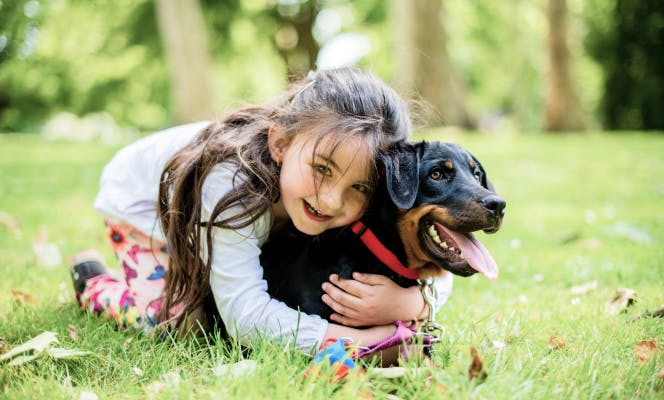
Dogs provide immeasurable value to humans in the form of unconditional love and companionship. Having a dog can teach any child about responsibility, loyalty and friendship–not to mention that they offer a consistent source of entertainment and play. For special needs children, a service or support animal can provide all that and more!
The right dog can help a physically or emotionally challenged child navigate many of the issues they face in daily life. For example, an emotional support animal can soothe frayed nerves and reduce panic attacksin a child with autism, anxiety or depression.
In addition, a trained service dog can help a disabled, blind or deaf child overcome physical challenges. Service dogs can even raise the alarm and watch over a child with low blood sugar, seizures and other major health concerns.
How to Choose the Best Dog for a Special Needs Child
Experts at Mawoo recommend working with an ethical breeder who is aware of your child’s specific needs. A responsible breeder will help you choose the right puppy for your child, and walk you through the process of breed selection.
They’ll also be there to offer advice and support when you bring your child’s new puppy home. Our breeders provide socialization, genetic testing and health guarantees to get their puppies off to the best possible start with their new families.
Here are some key things to consider and discuss with your breeder when deciding on the best dog for your special needs child.
Size
Almost any size of dog can make a wonderful companion for a special needs child, depending on that child’s unique needs. Large breeds are generally more robust and able to handle a child’s pulling and prodding without getting hurt or upset. Big dogs can also provide a sense of security that is immensely valuable.
A small dog, however, can be just as comforting and calming as a big one. Little dogs can be taught to perform many valuable tasks that don’t require brute strength or large physical size. They’re also a great choice for families in apartments.
When choosing a service dog, it’s probably best to avoid Mini or Teacup breeds as they tend to be more fragile and prone to injury. These tiny dogs are often timid and overly excitable, which makes them less than ideal as support for a child with special needs.
Energy Level
Some dogs have loads of energy to spare, which means lots of walks, games and adventures are in order to keep them healthy and happy. Some children would love spending quality time with a high-energy dog–but plenty of kids, especially those with mobility issues, would probably prefer a gentler companion.
If you do decide on a particularly athletic dog for your child, another family member may have to provide all those long walks and playtime to maintain the dog’s physical and mental health. Having a fenced-in yard or access to a doggie daycare or dog walker can be very helpful in this case.
Intelligence
When it comes to dog training, intelligence is a key factor. Most dogs can learn basic etiquette with consistent and proper training techniques, but some dogs are easier to train than others. Particularly clever dogs are usually eager to please their human companions, which makes them quick learners. The best dog breed for your special needs child will be one that’s known for its trainability and high intelligence.
Personality
The best dogs for kids with disabilities have a gentle disposition and a high tolerance for the indignities any child can inflict upon their pet. The dog should also be social and enjoy interacting with the people and other animals it may encounter when accompanying a child in their daily activities.
Types of Dogs for Children with Special Needs

Dogs for children with special needs usually fall into one of three categories: Service dogs, emotional support dogs and companion animals. Knowing which type of dog will meet your child’s needs best is essential for making an informed decision.
Service Dogs
A service dog is a dog that has received specialized training to perform certain tasks that benefit or support its owner. For example, a service dog for a child on the autism spectrum may be taught to track and locate a young person who is likely to wander off. A service dog is granted access to accompany the child in almost all public or private locations, including schools, restaurants, and anywhere else the child needs to go.
These dogs may be trained to intervene if a child self harms or is prone to accidents by acting as a buffer between them and dangerous objects. A dog may also be taught to sit on a child’s feet during a panic attack, easing anxiety and helping to ground the child.
Emotional Support Dogs
Emotional support dogs are given many of the same privileges as service dogs, but their primary function is to provide comfort to a child who is prone to anxiety or depression. Although emotional support dogs don’t receive specialized training, they are taught to be obedient and well-behaved in all public or private settings.
Companions and Pets
One of the greatest things about having a dog is simply the joy of bonding with a pet. Dogs–whether trained in service or not–provide amazing value as pets for children with special needs, though this title won’t allow them access to public places.
That inconvenience aside, having a pet can help a special needs child develop crucial social skills and self-confidence. Pets can also reduce stress and even minimize the problematic behaviours with which some children struggle.
Best Dog Breeds for a Special Needs Child
Every dog breed has its own unique personality type, physical abilities and aptitude, as well as its own health requirements. With this in mind, you can better focus on the canine traits that will best fit with your family. Check out the list below to learn more about some great service dog breeds!
Golden Retriever
Golden Retrievers are incredibly smart and quick to form a strong bond with their families. This breed is also large and sturdy, making Goldens an ideal companion for an active child. Golden Retrievers also have a low prey drive, so they’re more likely to get along well with other small pets in the household. Goldens are celebrated for their loving and gentle dispositions. Their ability to learn new commands and low tendency toward aggression makes them a popular choice as service dogs and emotional support dogs, as well as pets and companions.
If you are considering a Golden Retriever for your special needs child, keep in mind that regular brushing is a must to keep shedding under control. This breed also requires daily exercise and mental stimulation, as this is a clever breed!
Poodle
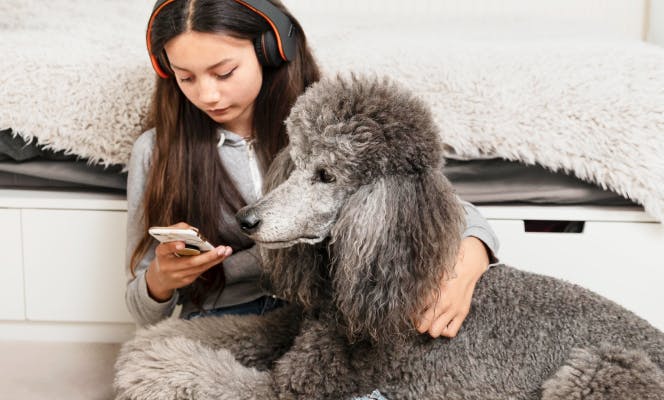 Photo by freepik - www.freepik.com
Photo by freepik - www.freepik.com
Poodles come in a variety of sizes, from Miniature and Toy to Giant. If your child is intimidated by large dogs or you live in an apartment, consider one of the smaller variations. On the other hand, if you can offer a bigger dog plenty of space to exercise, a Standard Poodle might be more appropriate.
Whatever the size, Poodles are incredibly smart and loyal, making them ideal service dogs, support dogs and family companions. They can be surprisingly protective of their owners, but also very affectionate and kid-friendly.
Poodles are often labelled as hypoallergenic since they don’t shed very much, but they do require regular grooming and haircuts to keep that curly coat neat and tidy. This breed enjoys long walks and a game of fetch just as much as a good snuggle and a lazy afternoon on the couch.
Labradoodle and Goldendoodle
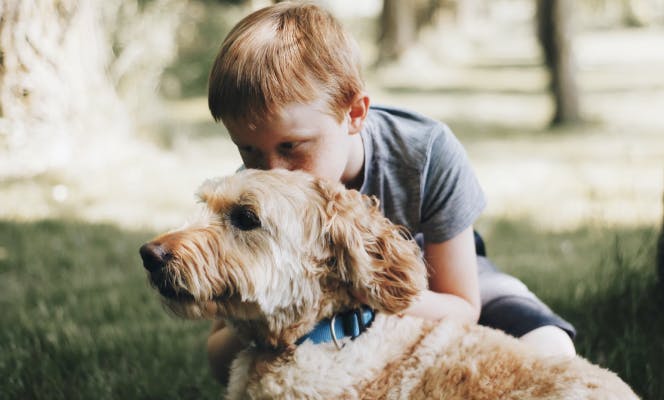
Doodle breeds, especially Labradoodles and Goldendoodles, can make excellent companions for children with special needs. These dogs usually have a lovely combination of traits from the Poodle and a Lab or Golden, which results in a sturdy, friendly dog that’s less prone to shedding.
Bichon Frise
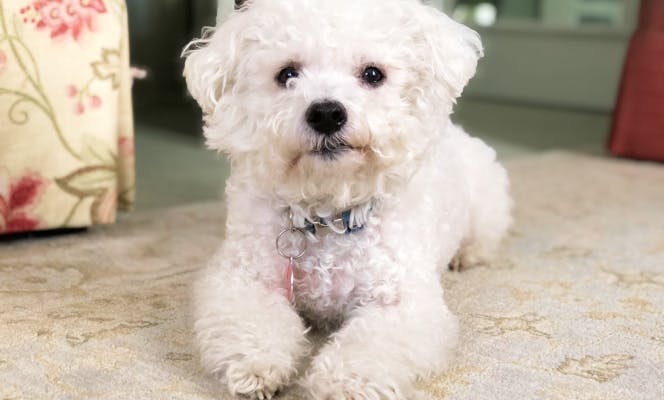
The Bichon Frise is an adorable little dog that makes an excellent family pet. This breed sheds very little, making it a good option for people with allergies. Bichons are also small and able to adapt easily to apartment life. Smart, sturdy and highly social, this breed meets the requirements of many children with special needs.
Bichons require regular grooming and haircuts to keep their coats neat and tidy. They also prefer an active lifestyle, but due to their smaller size, this can be accomplished in a smaller space and in less time than a larger breed may require.
Labrador Retriever
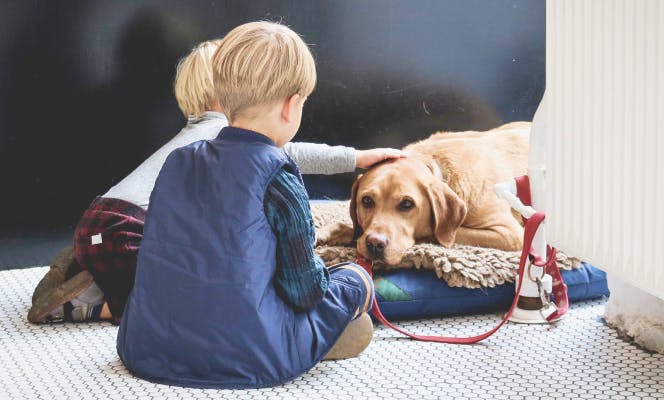
Labrador Retrievers are very popular as emotional support and service dogs for people of all ages. This breed is social, loyal, intelligent, highly trainable and rarely aggressive. Labradors make friends with everyone they meet and they’re generally good with children, including those with special needs.
This breed needs a lot of exercise, especially when young, and regular brushing. If your child has mobility issues, someone else in the household will need to take responsibility for exercise and grooming.
Boxer
Boxers have a long-standing history as one of the best breeds for kids. They are a sweet, loving, patient and playful breed with the ideal temperament for special needs kids. This breed is also a good fit for most families and living environments, as it’s very adaptable to family life whether in a small or large home.
Boxers are usually friendly with strangers and other animals, so they can be great for children who like to take their dog outdoors or to visit friends and family. Consistent training from an early age will help to ensure that a Boxer has good manners in public.
Great Dane
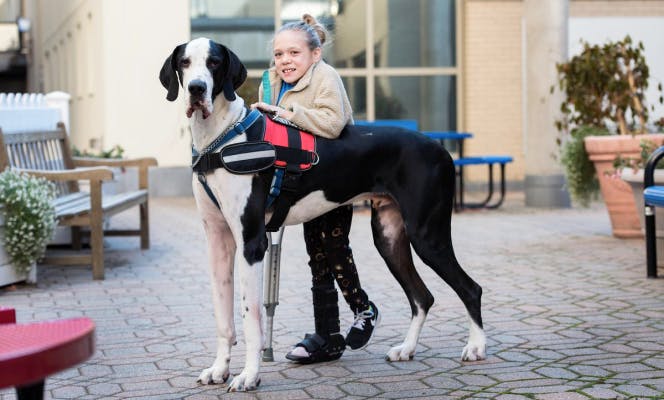
If you think your autistic or special needs child might enjoy a giant couch potato who loves to snuggle, a Great Dane just might be the perfect choice. This breed is smart, loving and exceptionally loyal. The sheer size of a Great Dane also provides a sense of security that’s hard to beat!
Great Danes do require plenty of space and a generous food budget, but the value these dogs can provide to a child can’t be overstated. Their nurturing nature and natural protectiveness provide numerous benefits for children on the autism spectrum, as well as those with varied mental or physical limitations.
Wrapping Up
Dogs can provide comfort, friendship, physical and emotional support to children with special needs. To find the perfect dog for your own child, consider your child’s individual requirements, your family’s lifestyle, and the traits of each breed.
If you’re still not sure which breed is the best fit for you, take our Puppy Match Quiz! Answer a couple of quick, easy questions to help you narrow down your choices even further. Remember, we’re here to offer guidance and support throughout every step of your journey.
Related articles
Related puppies for sale
Any questions? Get in touch!
We are here to support you every step of the way. Our concierge service is here daily to answer your questions!
Chat or speak with our team Mon-Sat 9a-9p ET.

